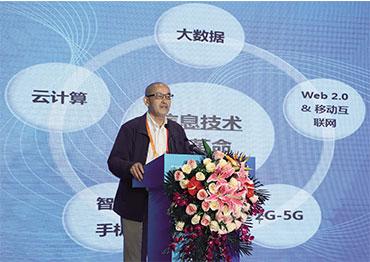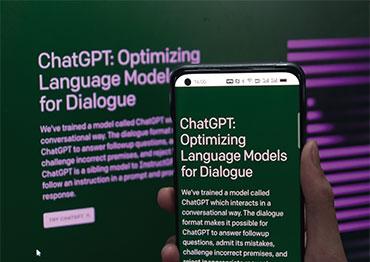hatGPT, the groundbreaking chatbot, has generated both enthusiasm for the future and concerns over the potential loss of human jobs.
But these apprehensions go far beyond employment. In an open letter posted online in late March, tech leaders such as Elon Musk, Turing Prize winner Yoshua Bengio and Apple co-founder Steve Wozniak called for at least a six-month pause in training AI systems more powerful than GPT-4, the cutting-edge language learning software developed by US startup OpenAI and backed by Microsoft.
“Should we risk losing control of our civilization?” asks the letter published on the website of Future of Life Institute (FLI), a non-profit organization in Cambridge, Massachusetts focused on policy advocacy involving transformative technologies such as AI.
The letter, which has garnered over 50,000 signatures of support according to FLI, urges AI labs and experts to utilize this pause to establish “a set of shared safety protocols for advanced AI design and development” and collaborate with policymakers to “dramatically accelerate the development of robust AI governance systems.”
Economist Zhu Jiaming, who chairs the Committee of Academic and Technological Affairs at the Digital Alliance Institute for Digital Finance Research, believes that labeling this technology a threat is premature. In an interview with China News Service, Zhu talks about the incoming wave of new developments in AI, how China should prepare, and the future of human development.
China News Service: ChatGPT is currently a trending topic in AI-generated content (AIGC) discussions. What is its significance?
Zhu Jiaming: AIGC represents the crucial direction of advances in artificial intelligence, and the right one for AI following extensive exploration. ChatGPT stands as a significant milestone in this process. More than just an AI product, ChatGPT seamlessly blends AI with modern economic activities, development models and daily life. This comprehensive integration has altered traditional economic principles, signifying a fundamental shift. However, considering it a threat is premature. The pressing concern lies in understanding, adapting to and applying the novel technologies AIGC brings forth to transform existing industries and industry models as well as driving innovation.
CNS: Bill Gates asserts that ChatGPT holds significance akin to the inception of the internet and the evolution of personal computers. Do you agree? What implications does ChatGPT truly present for human advancement?
ZJ: Reflecting on the history of technological advancements, Bill Gates’ assessment is quite reasonable, as AIGC technology represents a significant revolution following the internet and computer revolutions. AI has taken the internet to a new level. In the future, the primary actors on the internet, besides humans, will predominantly be AI products, particularly human-controlled, AI-based internet systems.
AIGC is entering a crucial preliminary stage. 2022 is a very critical year, and the emergence of ChatGPT demonstrates AI’s immense potential. Businesses have achieved numerous AIGC-related innovations, and ChatGPT is set to accelerate this process. It will bring AI to the vital stage of direct human-machine dialogue on par with human-human conversation. It is anticipated that in the next two to three years, AIGC will progressively reach its developmental peak.
Some have expressed concern that applications like ChatGPT may diminish human cognitive abilities. On the contrary, it will challenge and push humans to enhance their capabilities. As we discover that AI can perform tasks previously exclusive to humans, we must contemplate what unique abilities we possess that AI lacks. When humans raise this question and address it, we are making progress.
CNS: ChatGPT has also sparked discussions over academic fraud, tech abuses and manipulation of public opinion. What are your thoughts?
ZJ: Any technological advancement or revolution brings its own risks, which can be addressed in two primary ways. First, a regulatory system should be established with corresponding legal constraints. The legal system and regulatory framework should not evolve independently of technological progress, but rather adapt to the times. Second, many issues arising from technological revolutions and advancements are ultimately solved through further scientific and technological progress. Some current problems may naturally dissipate as technology advances to the next stage.
CNS: ChatGPT has reignited debates about AI replacing human workers. Which industries do you believe are most susceptible to its effects?
ZJ: In the next two to three years, AI is unlikely to cause widespread, large-scale unemployment. Applications like ChatGPT will not significantly threaten the overall job market. In the long run, AI development will expand human activities, alter their patterns, and reach a stage where AI co-exists with humans, mutually enhancing progress. This evolution will force humans to adapt in two ways.
First, humans will transition from traditional creative activities to more advanced ones, while delegating lower-end creative tasks to AI. Second, AI will further integrate with robots, replacing human labor on a larger scale and to a greater extent, freeing humans from labor and enhancing their lives and work.
In this process, humans must make better choices, since we need more entrepreneurs to explore new fields and new industries. This will enable a gradual transition from the pre-AI generation to the post-AI generation.
CNS: Globally, where does China stand in the AI sphere? Can the country lead the race?
ZJ: It must be acknowledged that, at this stage, China is somewhat behind advanced Western countries. OpenAI, the creator of ChatGPT, is pretty much the undisputed leader. Many competitors, including tech giants like Google, will follow suit. The West will initiate a surge in the AI industrial chain grounded in the AIGC framework, with a focus on ChatGPT and similar products.
Therefore, China must implement comprehensive changes ranging from underlying technologies to foundation models (like GPT which is the foundation for other AI application systems). Accelerating progress is essential to close the gap with the West, which requires coordinated efforts of all stakeholders and an effective policy system. China needs a model that will support the industry’s development by strengthening the application of AIGC technologies. From basic research to applied research, it’s crucial for China to build an industrial policy system to stay competitive.
At the same time, businesses should strive to widen application opportunities, while researchers address information symmetry and fundamental research. Under government guidance, investors must commit to long-term investment for at least three to five years. A rush for early capital returns may cause businesses to shift direction at critical moments due to insufficient funding, resulting in missed historic opportunities.
During the technological revolution of the late 20th and early 21st centuries, investment were primarily characterized by long cycles, high risks and slow returns. As technology advances, it inevitably creates a spillover effect leading to increased business activity. Focusing on commercial objectives prematurely may not generate sufficient spillovers and only yield limited commercial benefits.
CNS: Western countries surpass China in foundational technologies while China excels in the practical application of these technologies. Why?
ZJ: A key factor is China’s lack of talent in basic research. But it does have a large market, a well-developed industrial system and skilled engineers, thus it boasts considerable advantages and potential in technology development. To compensate for its weaknesses, the country should fully leverage its own advantages in developing AIGC.
Reforming the education system is also necessary to expedite the cultivation of high-caliber tech talent. Few members of OpenAI’s founding team have gone through the lengthy traditional education process from undergraduate to post doctorate. For talent, the essence lies in maintaining imagination, creativity and “explosive strength,” referring to the passion, ability and stamina required to achieve breakthroughs.
Like athletes, high-caliber talents can only maintain this combination for a limited time. Just as the integrated circuit revolution and the semiconductor revolution were led by people in their 20s and 30s, so should today’s tech innovation. Young people must be provided with opportunities to unleash their explosive power. The cutting-edge technology is much like a sports competition – the fastest, strongest and record-breakers win.
CNS: What lessons can be drawn from China’s reform and opening-up to strengthen tech innovation?
ZJ: The most significant aspect of China’s reform and opening-up is the emancipation of the mind. China’s reform actually began with science and technology, marked by the National Science Conference in March 1978, where Chinese leader Deng Xiaoping stressed that “science and technology is productivity,” and Guo Moruo, author and then director of the Chinese Academy of Sciences, declared the dawn of “the spring of science.”
Modernization fundamentally involves the advancement of science and technology. The sci-tech revolution was the initial driving force of China’s reform and opening-up. Today, 45 years later, we should once again call for “the spring of science,” as global competition hinges on cutting-edge science and technology.

 Old Version
Old Version

